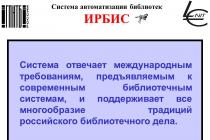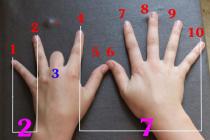Socialization of personality
Concept personality used to focus on the social essence of a person and an individual. Individuals are not born, but become in society in the course of interactions with other people through the acquisition of various social qualities. Thus, personality is a social characteristic of a person and an individual, which is based and interconnected with his biological and genetic inclinations.
Personality can be defined as a relatively stable system of social qualities acquired and developed in the process of interaction with other people in society.
The most important social qualities personality: self-awareness, self-esteem, social identification, activity, interests, beliefs, goals in life. Self-awareness is the ability inherent only to a person to be aware of himself in the system of social relations. Social identification is the result of conscious and emotional self-identification of oneself with other people with another community; activity - the ability to perform socially significant actions, manifested in interaction with other people; interests are a constant source of activity based on needs; beliefs - socio-psychological assessments and perceptions of the surrounding world, they are moral, ideological, scientific, religious, etc. Having goals in life and striving to realize them is essential characteristic formed personality. The goals of life are differentiated into four main groups: 1) material wealth; 2) knowledge and creativity; 3) power, prestige, authority; 4) spiritual perfection.
Personality can be viewed as the result of a variety of behaviors that are characteristic of any individual in a particular social group and society as a whole. A behavior model called social role, inherent in this or that individual in accordance with his social status, i.e. position in society, social group. All social statuses can be divided into two main types: those that are prescribed an individual by a society or a group, regardless of his abilities and efforts, and those that a person reaches by their own efforts.
Each person in the social system occupies several positions. Therefore, sociologists use the concept - status dialing, those. the totality of all social statuses of a given person. But more often than not, only one status determines the position in society. This status is called the main, or integral. It often happens that the main (integral) status is determined by the position (for example, rector, economist, etc.). The set of roles arising from a given status set is called role-playing set.
The social role contains two main elements: role expectations - what is expected from a particular role, and role behavior - what a person actually fulfills within the framework of his role. Any social role, according to Talcott Parsons, can be described using five main characteristics: emotionality, method of obtaining, scale, formalization and motivation.
Sociologists note the fundamental role that interests play in the behavior of an individual. In turn, the interests of the individual are based on needs. Need can be defined as a need, a person's need for something. The main problems of needs analysis are to establish their full composition, hierarchy, boundaries, levels and opportunities for satisfaction. Currently in science there are many classifications of needs. In classification K. Alderfer there are three groups of needs: existence, communication and growth. D. McClelland highlights the needs of achievement, participation and power. These needs do not have a hierarchical structure; they interact depending on the individual psychology of a person. For example, the need for achievement, according to McClelland, means a competition with some standards of excellence, the desire to surpass them.
The most famous is the classification proposed Abraham Maslow... He identified five groups of needs: 1) physiological ( life activity ) , 2) security, 3) involvement and affiliation(to the team, society), 4) confessions(respect and love), 5) self-actualization(self-realization, self-expression). According to Maslow, the needs of the first two groups are innate, i.e. biological, and from the third group, acquired needs begin, i.e. social. Human behavior is driven not by the need itself, but, first of all, by the degree of its dissatisfaction. The true essence of a person, the deep meaning of his life is most consistent with social needs, the main one of which is the need for self-realization. An important aspect of needs analysis is their hierarchy. It is objectively predetermined, first of all, by the fact that the condition for the emergence of intellectual and spiritual needs is the functioning of the physiological systems of the human body. When the needs of a certain group are satisfied, they cease to be relevant and to direct the activity of a person and the transition to the next higher group of needs is motivated. However, this dependence should not be absolutized. Not always, the need for creativity and self-realization can appear only after the complete satisfaction of all other needs, as evidenced by the biographies of many outstanding people. While there is undoubtedly some consistency in meeting needs, it cannot be considered the same for everyone.
There are three main levels of satisfaction of the needs of existence: 1) minimum, 2) normal, 3) luxury level... The minimum level of satisfaction of the needs of existence ensures human survival. The normal level allows significant intellectual and spiritual needs to arise. The level of luxury is proposed to be considered one in which the satisfaction of the needs of existence becomes an end in itself and (or) a means of demonstrating a high social status. After reaching normal(basic) level of satisfaction of the needs of existence are formed by the needs to achieve the goals of life. Depending on individual inclinations, abilities and aspirations, some people after satisfying basic needs will be dominated by the desire to maximize the consumption of material goods; for others - to spiritual perfection, etc. The structure of needs can change for the same person during different periods of his life.
In scientific literature, and even more so in everyday life, the concepts of “person”, “individual”, “individuality”, “personality” are widely used, often without making distinctions, while there is a significant difference between them.
Human- a biosocial being, the highest level of the animal type.
Individual- a single person.
Individuality- a special combination of natural and social in a person, inherent in a specific, separately taken individual, distinguishing him from others. Each person is individual, figuratively speaking, has his own face, which is expressed by the concept of “personality”.
This is a very complex concept, the study of which takes place at the junction of the natural and the social. Moreover, representatives of different schools and directions view it through the prism of the subject of their science.
- Socio-biological school (Z. Freud and others), is associated with the struggle in our minds of unconscious instincts and moral prohibitions dictated by society.
- The theory of the "mirror self" (C. Cooley, J. Mead), in which “I” is a part of the personality, which is made up of self-consciousness and the image of “I”. In accordance with this concept, a personality is formed in the process of its social interaction and reflects a person's ideas about how other people perceive and evaluate him. In the course of interpersonal communication, a person creates his own mirror self, which consists of three elements:
- ideas about how other people perceive him;
- ideas about how they evaluate it;
- how a person responds to a perceived reaction from other people.
So in theory "Mirror self" personality acts as a result of social interaction, during which the individual acquires the ability to evaluate himself from the point of view of other members of a given social group.
As you can see, the Mead's concept of personality, in contrast to the theory of Z. Freud, is completely social.
- Role theory (J. Moreno, T. Parsons), according to which the personality is a function of the totality of social roles that the individual performs in society.
- Anthropological School (M. Lundman), not separating the concepts of "person" and "personality".
- Marxist sociology in the concept of "personality" reflects the social essence of a person as a set of social relations that determine the social, psychological and spiritual qualities of people, socialize their natural and biological properties.
- Sociological approach, which is guided by many modern sociologists, is the representation of each person as a person, to the extent of development, the acquisition of socially significant traits and qualities. These include the level of education and vocational training, the totality of knowledge and skills that make it possible to realize various positions and roles in society.
Based on the above theoretical provisions, it is possible to determine personality how individual manifestation of the totality of social relations, the social characteristics of a person.
As an integral social system, the personality has its own internal structure, which consists of levels.
Biological level includes natural, common in origin personality traits (body structure, gender and age characteristics, temperament, etc.).
Psychological level personality is united by its psychological characteristics (feelings, will, memory, thinking). Psychological features are closely related to the heredity of the individual.
Finally, social level of personality divided into three sublevel:
- actually sociological (motives of behavior, personal interests, life experience, goals), this sublevel is more closely connected with public consciousness, which is objective in relation to each person, acting as a part of the social environment, as a material for individual consciousness;
- specific-cultural (value and other attitudes, norms of behavior);
- moral.
When studying the personality as a subject of social relations, sociologists pay special attention to the internal determinants of her social behavior. These determinants include, first of all, needs and interests.
Needs- these are the forms of interaction with the world (material and spiritual), the need for which is due to the peculiarities of reproduction and the development of its biological, psychological, social certainty, which are realized, felt by a person in any form.
Interests- these are the conscious needs of the individual.
The needs and interests of an individual lie at the basis of his value attitude to the world around him, at the basis of the system of his values and value orientations.
Some authors in personality structure include and other elements: culture, knowledge, norms, values, activities, beliefs, value orientations and attitudes that constitute the core of the personality, acting as a regulator of behavior, directing it into those normative frameworks that are prescribed by society.
A special place in the structure of personality is occupied by it and its role.
Having matured, a person actively enters, "takes root" into social life, striving to take his place in it, to satisfy personal needs and interests. The relationship between the individual and society can be described by the formula: the society offers, the individual seeks, chooses his place, trying to realize his interests. At the same time, she shows, proves to society that she is in her place and will perform well a certain role assigned to him.
Social status of a person
The social functions of the individual and the rights and obligations arising from them in relation to other participants in social interaction determine her social status, that is, that set of actions and the corresponding conditions for their execution, which are assigned to a given social status of a person who occupies a certain place, position in the social structure. Social status of a person is a characteristic of social positions, on which it is located in a given social coordinate system.
Society makes sure that the person regularly fulfills his roles, social functions. Why endows her with a certain social status. Otherwise, it puts another person in this place, believing that it will better cope with social responsibilities, will bring more benefits to other members of society who play different roles in it.
Social statuses are prescribed(gender, age, nationality) and achieved(student, assistant professor, professor).
Achieved statuses are consolidated taking into account abilities, achievements, which gives a perspective to everyone. In an ideal society, most statuses are attainable. In real life, this is far from the case. Each personality has many statuses: father, student, teacher, public figure, etc. Among them the main one stands out, which is the most important and valuable for society. It corresponds to social prestige a given person.
Each status is associated with a certain expected behavior during the execution of the corresponding functions. In this case, we are talking about the social role of the individual.
Social role of personality
Social role Is a set of functions, a more or less clearly defined pattern of behavior that is expected from a person, occupying a certain status in society. So, a family man plays the role of a son, husband, father. At work, he can simultaneously be an engineer, a technologist, a foreman of a production site, a member of a trade union, etc. Of course, not all social roles are equal for society and are equal for an individual. Family and household, professional and socio-political roles should be singled out as the main ones. Thanks to their timely development and successful implementation by members of society, normal functioning of the social organism is possible.
To each man there are many situational roles... Entering the bus, we become passengers and are obliged to follow the rules of conduct in public transport. After finishing the trip, we turn into pedestrians and follow the traffic rules. We behave differently in the reading room and in the store, because the role of the buyer and the role of the reader are different. Deviations from the requirements of the role, violations of the rules of behavior are fraught with unpleasant consequences for a person.
The social role is not a rigid model of behavior. People perceive and fulfill their roles differently. However, the society is interested in the fact that people can master, skillfully perform and enrich social roles in accordance with the requirements of life. First of all, this applies to the main roles: worker, family man, citizen, etc. In this case, the interests of society coincide with the interests of the individual. WITH social roles - forms of manifestation and development of personality, and their successful implementation is the key to human happiness. It is easy to see that truly happy people have a good family and successfully cope with their professional duties. They consciously participate in the life of society and in public affairs. As for friendly companies, leisure activities and hobbies, they enrich life, but they are not able to compensate for failures in the implementation of basic social roles.
Social conflicts
However, it is not at all easy to achieve harmony of social roles in human life. This requires a lot of effort, time, ability, as well as the ability to resolve conflicts arising from the performance of social roles. This could be intra-role, inter-role and personality-role.
To intra-role conflicts include those in which the requirements of one role contradict, oppose each other. Mothers, for example, are prescribed not only kind, affectionate treatment of their children, but also exactingness and severity towards them. It is not easy to combine these precepts when the beloved child is guilty and deserves punishment.
Inter-role conflicts arise when the requirements of one role contradict, oppose the requirements of another role. The double employment of women is a striking illustration of this conflict. The workload of married women in social production and in everyday life often does not allow them to fully and without prejudice to their health to fulfill their professional duties and to manage the household, to be a charming wife and caring mother. Many considerations have been expressed about how to resolve this conflict. The most realistic at present and in the foreseeable future are the relatively even distribution of household responsibilities among family members and a reduction in the employment of women in public production (part-time work, weekly work, the introduction of flexible hours, the spread of home work, etc.) . NS.).
Student life, contrary to popular beliefs, is also not complete without role conflicts. To master the chosen profession, to get an education, it is required to focus on educational and scientific activities. At the same time, a young person needs a variety of communication, free time for other activities and hobbies, without which it is impossible to form a full-fledged personality, create a family. The situation is complicated by the fact that neither education nor a variety of communication can be postponed until a later date without prejudice to personality formation and professional training.
Personality-role conflicts arise in situations where the requirements of a social role contradict the properties and life aspirations of the individual. So, a social role requires from a person not only extensive knowledge, but also good volitional qualities, energy, the ability to communicate with people in different, including critical, situations. If a specialist lacks these qualities, then he cannot cope with his role. People say about this: "Not a hat for Senka."
Each person included in the system of social relations has an infinite number of social connections, is endowed with many statuses, performs a whole set of different roles, is the bearer of certain ideas, feelings, character traits, etc. this is not necessary. In sociology essential not individual, but social properties and personality traits, i.e. quality, possessed by many individuals under similar objective conditions. Therefore, for the convenience of researching individuals with a set of recurring essential social qualities, they are typologized, that is, they are referred to a certain social type.
Social personality type- a generalized reflection, a set of repetitive social qualities inherent in many individuals who are part of any social community. For example, European, Asian, Caucasian types; students, workers, veterans, etc.
Typologization of personalities can be carried out on various grounds. For example, by professional affiliation or type of activity: miner, farmer, economist, lawyer; by territorial affiliation or lifestyle: city dweller, village dweller, northerner; by sex and age: boys, girls, pensioners; according to the degree of social activity: leader (leader, activist), follower (performer), etc.
Sociology distinguishes modal,basic and ideal personality types. Modal call the average personality type, which really prevails in a given society. Under basic the type of personality that best meets the needs of the development of society is understood. Ideal the type of personality is not tied to specific conditions and is considered as the standard of the personality of the future.
An American sociologist and psychologist made a great contribution to the development of a social typology of personality E. Fromm(1900-1980), who created the concept of social character. By the definition of E. Fromm, social character is the core of the character structure, common to the majority members of a particular culture. Fromm saw the significance of the social character in the fact that it allows one to adapt most effectively to the requirements of society and gain a sense of security and safety. According to E. Fromm, classical capitalism is characterized by such traits of a social character as individualism, aggressiveness, and the desire for accumulation. In modern bourgeois society, a social character is emerging, oriented towards mass consumption and marked by a sense of satiety, boredom and anxiety. Accordingly, E. Fromm singled out fourtype of social nature:receptive(passive), exploitative, storage and market He considered all these types to be infertile and opposed them to the social character of a new type, contributing to the formation of an independent, independent and active personality.
In modern sociology, the allocation of personality types depending on the their value orientations.
- Traditionalists are focused mainly on the values of duty, order, discipline, law abidance, and such qualities as independence and the desire for self-realization, of this type personalities are very weakly expressed.
- Idealists, on the contrary, have a strong expression of independence, a critical attitude towards traditional norms, attitudes towards self-development and disregard for authority.
- Realists combine the desire for self-realization with a developed sense of duty and responsibility, healthy skepticism with self-discipline and self-control.
They show that the specificity of relations in various spheres of social life stimulates the manifestation of certain personal qualities and types of behavior. So, market relations contribute to the development of entrepreneurship, pragmatism, cunning, prudence, the ability to submit oneself; interactions in the sphere of production form egoism, careerism and forced cooperation, and in the sphere of family and personal life - emotionality, cordiality, affection, the search for harmony.
Interrelation, interdependence of the individual and society
Consider the different concepts presented by M. Weber and K. Marx.
M. Weber sees in the role of the subject of public life only individual individuals that act meaningfully. And such social totals as "classes", "society", "state", in his opinion, are completely abstract and cannot be subjected to social analysis.
Another solution to this problem contains the theory K. Marx... In his understanding, the subjects of social development are social formations of several levels: humanity, classes, nations, state, family and personality. The movement of society is carried out as a result of the actions of all these subjects. However, they are by no means equivalent and the strength of their impact varies depending on historical conditions. In different eras, such a subject is put forward as the decisive one, which is the main driving force of a given historical period.
Nevertheless, it must be borne in mind that in the concept of Marx, all subjects of social development operate in line with the objective laws of the development of society. They can neither change these laws nor abolish them. Their subjective activity either helps these laws to act freely and thus accelerates social development, or prevents them from acting and then inhibits the historical process.
How is the problem of interest to us presented in this theory: personality and society. We see that the personality is here recognized as the subject of social development, however, it is not highlighted and does not fall into the number of the driving forces of social progress. According to Marx's concept, personality Not only subject, but also object of society... It is not an abstract inherent in a separate individual. In its reality she is the totality of all social relations... The development of an individual is conditioned by the development of all other individuals with whom he is in direct or indirect communication; it cannot be torn away from the history of the individuals preceding and contemporary to him. Thus, the vital activity of the individual in the concept of Marx is comprehensively determined by society in the form of the social conditions of its existence, the heritage of the past, the objective laws of history, etc., although some space for its social action still remains. According to Marx, history is nothing more than the activity of a person who pursues his goals.
And now let's return to reality, the life of modern Russians in the 21st century. The Soviet totalitarian state collapsed. New social conditions and values have emerged. And it turned out that many people cannot perceive, master, assimilate, find their new path in such a difficult time. Hence the social pathologies that are now the pain of our society - crime, alcoholism, drug addiction, suicide.
Obviously, time will pass and people will learn to live in new social conditions, to seek and find the meaning of life, but this requires the experience of freedom. She created a vacuum of existence, breaking traditions, estates and so on, and she will teach you how to fill it. In the West, people are already making some progress in this direction - they have studied longer. Very interesting ideas in this regard are expressed by the Austrian scientist Dr. V. Frankl. He believes that it is natural for a person to strive to ensure that his life is meaningful. If there is no sense, this is the most difficult state of the personality. There is no common sense of life for all people, it is unique for everyone. The meaning of life, says Frankl, cannot be invented, invented; it must be found, it exists objectively outside of man. The tension that arises between a person and the external meaning is a normal, healthy state of the psyche.
Despite the fact that the meaning of everyone's life is unique, there are not so many ways in which a person can make his life meaningful: what we give life (in the sense of our creative work); what we take from the world (in terms of experiences, values); what position we take in relation to fate if we cannot change it. In accordance with this, three groups of values can be distinguished: the values of creativity, the values of experiences and the values of relationships. The realization of values (or at least one of them) can help to comprehend human life. If a person does something in excess of the prescribed duties, brings something of his own to the work, then this is already a meaningful life. However, the meaning of life can also be given by an experience, for example, love. Even one single brightest experience will make the past life meaningful. But deeper is the third group of values - the values of the relationship. A person is forced to resort to them when he cannot change the circumstances, when he finds himself in an extreme situation (hopelessly ill, deprived of freedom, lost a loved one, etc.). Under any circumstances, a person can take a meaningful position, for a person's life retains its meaning to the end.
The conclusion can be made quite optimistic: despite the spiritual crisis in many people modern world, a way out of this state will nevertheless be found to the extent that people will master new free forms of life, the possibility of self-realization of their abilities, achievement of life goals.
Self-realization of a person, as a rule, occurs not in one, but in several types of activity. except professional activity, most people strive to create a strong family, have good friends, interesting hobbies, etc. All the various types of activities and goals in the aggregate create a kind of system for orienting the individual for the long term. Based on this perspective, the individual chooses the appropriate life strategy (the general direction of the life path).
Life strategies can be roughly divided into three main types:
- life well-being strategy - the desire to create favorable living conditions, to earn another million;
- life success strategy - the desire to get the next position, the next rank, conquer the next peak, etc .;
- strategy of life self-realization - the desire to maximize their abilities in certain types of activities.
The choice of a particular life strategy depends on three main factors:
- objective social conditions that society (state) can provide to an individual for his self-realization;
- an individual's belonging to a particular social community (class, ethnic group, social stratum, etc.);
- social and psychological qualities of the personality itself.
For example, the majority of members of a traditional or crisis society, in which the problem of survival is the main one, are forced to adhere to a strategy of well-being. V a democratic society with developed market relations, the most popular is life success strategy. In a social society(the state), in which the basic social problems have been solved for the overwhelming majority of citizens, can be very attractive life self-realization strategy.
The life strategy can be chosen by an individual once and for life, or it can change depending on those or other circumstances. Thus, the individual has fully implemented the strategy of life success and decided to focus on a new strategy, or the individual is forced to abandon the previously chosen strategy (a scientist who has lost his job, a bankrupt businessman, a retired military man, etc.).
The role theory of personality occupies an important place in the sociology of personality. The main provisions of this theory were formulated by the American sociologists J. Mead and R. Minton, were actively developed by R. Merton and T. Parsons, as well as the West German sociologist R. Dahrendorf. What are the main provisions of this theory? The role theory of personality describes its social behavior in two main concepts: "social status" and "social role".
Each person in the social system occupies several positions. Each of these positions, which imply certain rights and obligations, is called a status. A person can have several statuses. But more often than not, only one determines his position in society. This status is called main, or integral. It often happens that the main, or integral, status is determined by his position (for example, director, professor).
Social status is reflected both in external behavior and appearance (clothing, jargon and other signs of social and professional belonging), and in internal position (in attitudes, value orientations, motivations, etc.).
Sociologists distinguish prescribed and acquired statuses. Prescribed- it means imposed by society, regardless of the efforts and merit of the individual. It is obtained by a person from birth and is determined by ethnic origin, place of birth, family.
Acquired (achievable) status determined by the efforts of the person himself (for example, writer, general secretary, director) - achieved due to the level of education, professional achievements.
Also stand out natural and professional status.
Natural status personality presupposes essential and relatively stable characteristics of a person (men and women, childhood, adolescence, maturity, old age).
Professional and job- This is the basic status of a person, for an adult, most often, which is the basis of an integral status. It fixes the social, economic and production-technical situation (banker, engineer, lawyer).
Social status designates a specific place that an individual occupies in a given social system.
Sociologists generally view status as a phenomenon with two dimensions: horizontal and vertical... Under horizontal dimension the system of social contacts and mutual exchanges, both real and simply possible, that develop between the bearer of the status and other individuals who are at the same level of the social ladder is understood.
Vertical dimension forms contacts and exchanges that arise between the bearer of the status and individuals at higher and lower levels.
The totality of the requirements imposed on the individual by society forms the content of the social role.
Social role is a set of actions that must be performed by a person holding a given status in the social system. Each status usually includes a number of roles. The set of roles resulting from a given status is called a role set.
One of the first attempts to systematize roles was undertaken by T. Parsons. He believed that any role is described by 5 main characteristics:
Emotional - some roles require emotional restraint, others - relaxedness;
· By the method of obtaining - some are prescribed, others are conquered;
• by scale - some of the roles are formulated and strictly limited, while others are blurred;
· Formalization - an action in strictly established rules or arbitrary;
· Motivation - for personal profit, for the common good. Any role is characterized by some set of these five properties.
The social role should be considered in two aspects: role expectation and role performance. Our roles are determined primarily by what others expect of us. These expectations are associated with the status that the person has. Role requirements (prescriptions, positions and expectations of appropriate behavior) are embodied in specific social norms grouped around social status.
In the normative structure of a social role, 4 elements are usually distinguished:
1) a description of the type of behavior corresponding to the given role;
2) prescriptions (requirements) related to this behavior;
3) assessment of the performance of the prescribed role;
4) sanction - the social consequences of an action within the framework of the requirements of the social system.
Social sanctions by their nature can be moral, legal, political, environmental, implemented through the activities of specific social institutions. The point of social sanctions is to induce a person to behave in a certain way. They are one of the most important elements of social regulation.
It should be noted that any role is not a pure model of behavior. The main link between role expectations and role behavior is the character of the individual. This means that the behavior of a particular person does not fit into a pure scheme. It is the product of a unique, unique way of interpreting and interpreting roles.
Several factors affect the performance of a social role:
Biopsychological capabilities of a person - inhibit or contribute to the performance of the role
A set of ways of human behavior that are expected of him
The role of a person in a group, social control in a group
The structure of the group, its cohesion, the degree of identification of the individual with this group
Page 54 of 100
54. Social status. Systematization of social roles
Each person in the social system occupies several positions. Each of these positions, which imply certain rights and obligations, is called a status. A person can have several statuses. But more often than not, only one determines his position in society. This status is called main, or integral. It often happens that the main, or integral, status is determined by his position (for example, director, professor). Social status is reflected both in external behavior and appearance (clothing, jargon and other signs of social and professional belonging), and in internal position (in attitudes, value orientations, motivations, etc.).
Sociologists distinguish between prescribed and acquired statuses. Prescribed- it means imposed by society, regardless of the efforts and merit of the individual. It is determined by ethnicity, place of birth, family, etc. Acquired(achieved) status is determined by the efforts of the person himself (for example, writer, scientist, director, etc.). Natural and professional-job statuses are also distinguished. Natural personality status presupposes significant and relatively stable characteristics of a person (men and women, childhood, adolescence, maturity, old age, etc.). Professional and job- This is the basic status of a personality, most often for an adult, which is the basis of an integral status. It records the social, economic and production-technical situation (banker, engineer, lawyer, etc.).
Social status denotes a specific place that an individual occupies in a given social system. The totality of the requirements for an individual to a society forms the content of a social role. Social role Is a set of actions that must be performed by a person holding a given status in the social system. Each status usually includes a number of roles. The set of roles resulting from a given status is called a role set.
The social role breaks down into role expectations- what, according to the "rules of the game", is expected from a particular role, and on role behavior- what a person actually performs within the framework of his role. Each time, assuming a particular role, a person more or less clearly understands the rights and obligations associated with it, approximately knows the scheme and sequence of actions and builds his behavior in accordance with the expectations of others. At the same time, the society makes sure that everything is done "as it should". For this, there is a whole system of social control - from public opinion to law enforcement agencies and the corresponding system of social sanctions - from censure, conviction to violent suppression.
Talcott Parsons tried to systematize social roles. He believed that any role can be described using five main characteristics:
1. Emotionality... Some roles (for example, a nurse, doctor, or police officer) require emotional restraint in situations that are usually accompanied by violent manifestations of feelings (we are talking about illness, suffering, death). Family members and friends are expected to express their feelings less discreetly.
2. Method of obtaining... Some roles are conditioned by prescribed statuses, for example, child, youth, or adult citizen; they are determined by the age of the person playing the role. Other roles are being won; when we talk about a professor, we mean a role that is not achieved automatically, but as a result of the efforts of the individual.
3. Scale... Some roles are limited to strictly defined aspects of human interaction. For example, the roles of the doctor and patient are limited to issues that are directly related to the health of the patient. A broader relationship is established between the young child and his mother or father; each of the parents is concerned about many aspects of the baby's life.
4. Formalization... Some roles provide for interaction with people in accordance with the established ones. rules. For example, a librarian is obliged to lend books for a certain period of time and demand a fine for each delayed day from those who delay the books. In other roles, special treatment is allowed for those with whom you have a personal relationship. For example, we do not expect a brother or sister to pay us for a service rendered to us, although we might take a payment from a stranger.
5. Motivation. Different roles are due to different motives. It is expected, say, that an enterprising person is absorbed in his own interests - his actions are determined by the desire to obtain maximum profit. But the priest is supposed to work primarily for the public good and not for personal gain. According to Parsons, any role includes some combination of these characteristics.
Each person in the social system occupies several positions. Each of these positions, which imply certain rights and obligations, is called a status. A person can have several statuses. But more often than not, only one determines his position in society. This status is called main, or integral. It often happens that the main, or integral, status is determined by his position (for example, director, professor). Social status is reflected both in external behavior and appearance (clothing, jargon and other signs of social and professional belonging), and in internal position (in attitudes, value orientations, motivations, etc.).
Sociologists distinguish between prescribed and acquired statuses. Prescribed means imposed by society, regardless of the efforts and merit of the individual. It is determined by ethnicity, place of birth, family, etc. The acquired (achieved) status is determined by the efforts of the person himself (for example, writer, scientist, director, etc.). Natural and professional-job statuses are also distinguished. The natural status of a person presupposes significant and relatively stable characteristics of a person (men and women, childhood, adolescence, maturity, old age, etc.). Professional-official is the basic status of a person, most often for an adult, which is the basis of an integral status. It records the social, economic and production-technical situation (banker, engineer, lawyer, etc.).
Social status designates a specific place that an individual occupies in a given social system. The totality of the requirements for an individual to a society forms the content of a social role. A social role is a set of actions that must be performed by a person holding a given status in the social system. Each status usually includes a number of roles. The set of roles resulting from a given status is called a role set.
The social role breaks down into role expectations - what, according to the "rules of the game", is expected from a particular role, and into role behavior - what a person actually performs within the framework of his role. Every time, assuming a particular role, a person more or less clearly understands the rights and obligations associated with it, approximately knows the scheme and sequence of actions and builds his behavior in accordance with the expectations of others. At the same time, the society makes sure that everything is done "as it should". For this, there is a whole system of social control - from public opinion to law enforcement agencies and the corresponding system of social sanctions - from censure, conviction to violent suppression.
Talcott Parsons tried to systematize social roles. He believed that any role can be described using five main characteristics:
1. Emotionality. Some roles (for example, nurse, doctor or police officer) require emotional restraint in situations that are usually accompanied by violent manifestations of feelings (we are talking about illness, suffering, death). Family members and friends are expected to express their feelings less discreetly.
2. Method of obtaining. Some roles are conditioned by prescribed statuses, for example, child, youth, or adult citizen; they are determined by the age of the person playing the role. Other roles are being won; when we talk about a professor, we mean a role that is not achieved automatically, but as a result of the efforts of the individual.
3. Scale. Some roles are limited to strictly defined aspects of human interaction. For example, the roles of the doctor and patient are limited to issues that are directly related to the patient's health. A broader relationship is established between the young child and his mother or father; each of the parents is concerned about many aspects of the baby's life.
4. Formalization. Some roles provide for interaction with people in accordance with the established ones. rules. For example, a librarian is obliged to lend books for a certain period of time and demand a fine for every day overdue from those who delay the books. In other roles, special treatment is allowed for those with whom you have a personal relationship. For example, we do not expect a brother or sister to pay us for a service rendered to us, although we might take a payment from a stranger.
5. Motivation. Different roles are driven by different motives. It is expected, say, that an enterprising person is absorbed in his own interests - his actions are determined by the desire to obtain maximum profit. But the priest is supposed to work primarily for the public good and not for personal gain. According to Parsons, any role includes some combination of these characteristics.














